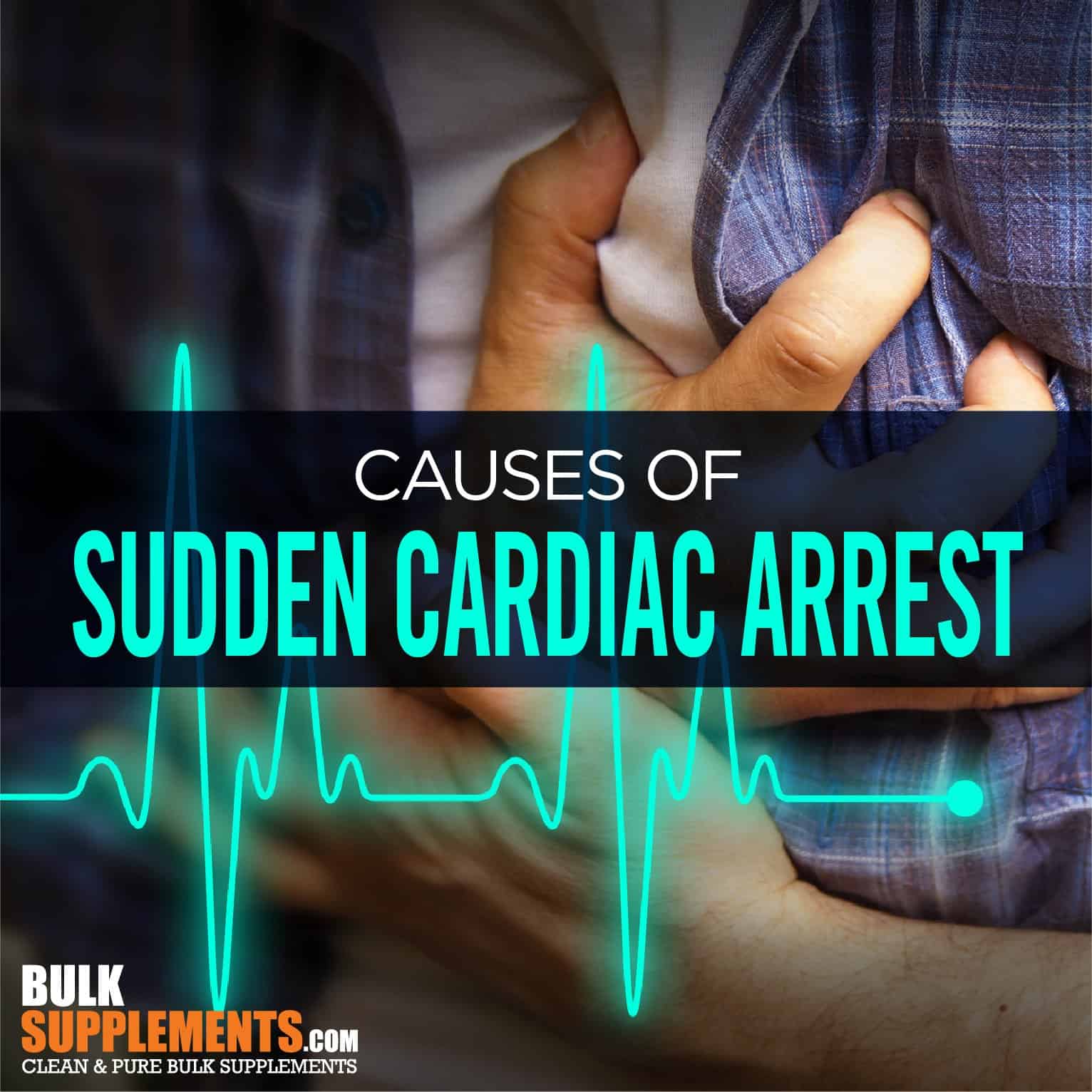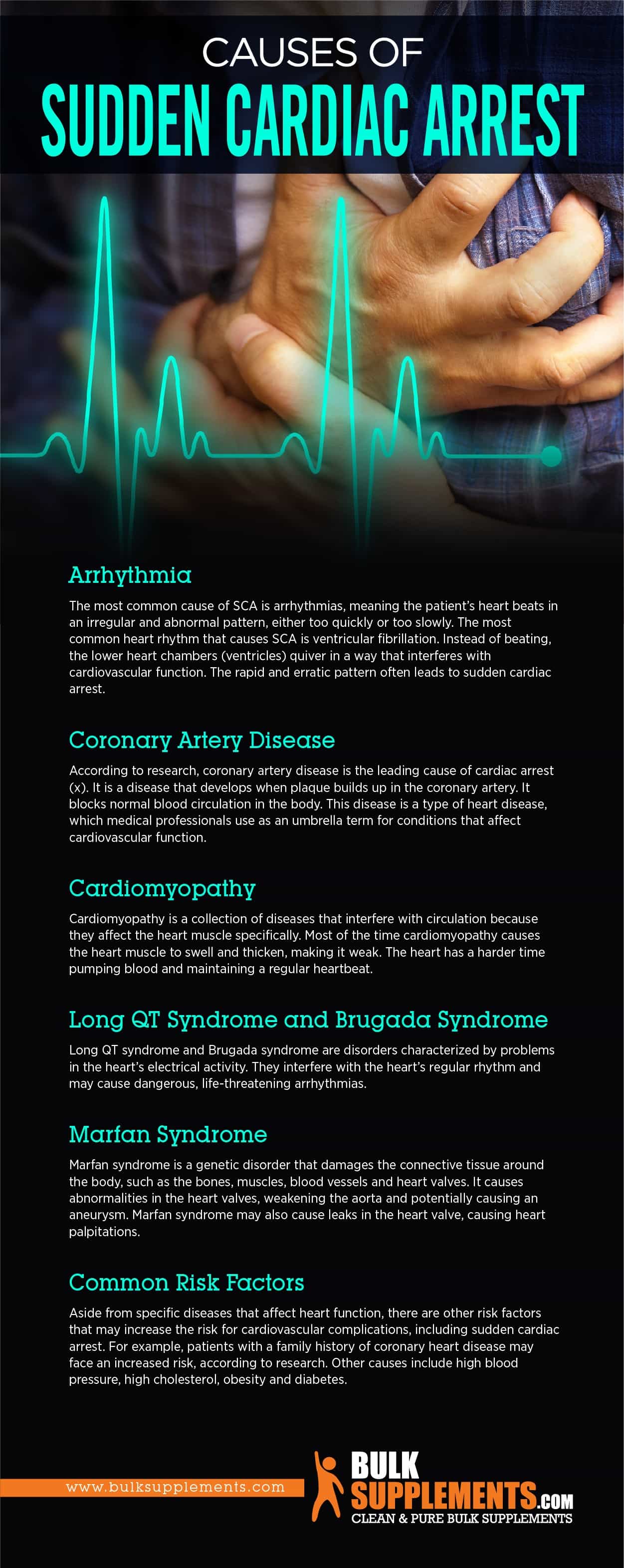Sudden Cardiac Arrest: Causes, Symptoms & Treatment
by James Denlinger Digital Marketing Strategist
What is Sudden Cardiac Arrest?
According to research, sudden cardiac arrest (SCA) has the highest cause of death in the United States. Each year, about 350,000 adults lose their lives to cardiac arrest and this number continues to rise. Sudden cardiac arrest is when a patient’s heartbeat stops suddenly and unexpectedly. Most of the time it occurs because of abnormalities in the heart rhythm, called arrhythmia. The heart is the central part of the circulatory system that pumps blood and oxygen to the rest of the body. However, during cardiac arrest the heart cannot properly supply blood and oxygen to the organs in the body.
In most cases, it affects patients age 35 and older. Patients with cardiovascular diseases may face an increased risk for cardiac arrest. However, according to research, about 66 percent of cases occur without any indications of heart disease. This condition is a medical emergency. It may not cause any warning signs or symptoms and the patient may lose their life within minutes.
Sudden Cardiac Arrest vs. Heart Attack
Sometimes patients may confuse sudden cardiac arrest with a heart attack. They are two different conditions, but they are connected. A heart attack is a result of a problem with blood circulation. Blockage in the coronary arteries causes them to narrow and the heart has trouble supplying blood and oxygen to the body. Blood and oxygen flow to the heart decreases and the patient may suffer a heart attack from the lack of oxygen. Most of the time symptoms develop slowly before the heart attack and the heart does not usually stop beating completely.
Meanwhile, sudden cardiac arrest is an electrical malfunction in the heart that occurs because of an irregular pattern in the patient’s heartbeat. The heart stops beating abruptly and fails to contract, which interferes with circulation.
What Is the Connection?
If a patient experiences a heart attack, it can increase the risk for sudden cardiac arrest. SCA can occur when a patient experiences a heart attack or if they are recovering from one. A heart attack does not necessarily mean the patient will experience sudden cardiac arrest. Sometimes a patient who has had a heart attack will not experience cardiac arrest. But if the patient does, heart attack is often the cause (x).
Signs & Symptoms of Sudden Cardiac Arrest
During sudden cardiac arrest, there is a lack of blood flow to the brain, causing the patient to lose consciousness. This is the first sign and usually it is the only sign. Although it often happens without warning, the patient may experience some other symptoms before:
- Chest pain
- Dizziness or lightheadedness
- Heart palpitations
- Fatigue
- Weakness
- Shortness of breath
What Causes Sudden Cardiac Arrest?
There are numerous other factors that may increase the risk for sudden cardiac arrest, both structural and nonstructural. Structural causes include arrhythmias, coronary artery disease and cardiomyopathy. Nonstructural causes include long QT syndrome, Brugada syndrome and Marfan syndrome.
Arrhythmia
The most common cause of SCA is arrhythmias, meaning the patient’s heart beats in an irregular and abnormal pattern, either too quickly or too slowly. The most common heart rhythm that causes SCA is ventricular fibrillation. Instead of beating, the lower heart chambers (ventricles) quiver in a way that interferes with cardiovascular function. The rapid and erratic pattern often leads to sudden cardiac arrest.
Coronary Artery Disease
According to research, coronary artery disease is the leading cause of cardiac arrest. It is a disease that develops when plaque builds up in the coronary artery. It blocks normal blood circulation in the body. This disease is a type of heart disease, which medical professionals use as an umbrella term for conditions that affect cardiovascular function.
Cardiomyopathy
Cardiomyopathy is a collection of diseases that interfere with circulation because they affect the heart muscle specifically. Most of the time cardiomyopathy causes the heart muscle to swell and thicken, making it weak. The heart has a harder time pumping blood and maintaining a regular heartbeat.
Long QT Syndrome and Brugada Syndrome
Long QT syndrome and Brugada syndrome are disorders characterized by problems in the heart’s electrical activity. They interfere with the heart’s regular rhythm and may cause dangerous, life-threatening arrhythmias.
Marfan Syndrome
Marfan syndrome is a genetic disorder that damages the connective tissue around the body, such as the bones, muscles, blood vessels and heart valves. It causes abnormalities in the heart valves, weakening the aorta and potentially causing an aneurysm. Marfan syndrome may also cause leaks in the heart valve, causing heart palpitations.
Common Risk Factors
Aside from specific diseases that affect heart function, there are other risk factors that may increase the risk for cardiovascular complications, including sudden cardiac arrest. For example, patients with a family history of coronary heart disease may face an increased risk, according to research. Other causes include high blood pressure, high cholesterol, obesity and diabetes.

Treatment for Sudden Cardiac Arrest
SCA is a medical emergency and it can be fatal within minutes. Saving the patient’s life requires immediate medical attention with cardiopulmonary resuscitation (CPR) and a defibrillator, which sends electric shocks to the heart to restore its normal rhythm. There are two types of defibrillators—external defibrillators and implantable cardioverter defibrillators (ICD).
External Defibrillators
An external defibrillator is small and portable and even those without medical training can use it. They are present in public places like hotels, malls, airports and convention centers to provide immediate medical assistance.
Implantable Cardioverter Defibrillators (ICD)
An implantable cardioverter defibrillator is a more advanced type of defibrillator. It goes into the patient’s skin and connects wires to the heart to track the heart rate. When it detects an abnormal heartbeat, it automatically sends an electric shock to the heart in order to restore its normal rhythm.
Supplements for Heart Health
Dietary supplements may also help strengthen the heart. Patients can try supplements to keep the body healthy, but they are not a cure or prevention for sudden cardiac arrest or any other disease or illness. Always consult with a doctor before adding any supplement to a dietary regimen.
Coenzyme Q10 (COQ10)
According to research, coenzyme Q10 may provide protective effects in the heart. The body naturally produces CoQ10 and it is also found in food like kidney, liver and other organ meats. Broccoli, asparagus, cauliflower, mackerel and sardines are also good sources of CoQ10. As a dietary supplement, the recommended dosage for CoQ10 powder is between 50 and 200 mg per day if a doctor approves the dosage.
Omega-3 Fatty Acids
Mostly found in fish, omega 3-6-9 fatty acids are an essential nutrient. These healthy fats may help boost heart function and potentially reduce the risk for heart disease, as well as regulate blood pressure. It contains DHA, which is also good for the heart. Fatty acids are present in fish, but patients may also take supplements. The recommended dosage for omega 3-6-9 fatty acid softgels is three softgels per day unless a doctor recommends a different dosage.
Garlic
According to research, garlic extract may have positive effects on heart health. Studies on both animals and humans demonstrate a correlation between cardiovascular disease and diet. Specifically, the research suggests that it may reduce the rate at which cardiovascular diseases progress in the body, including stroke and cancer. As a dietary supplement, the recommended dosage for garlic extract powder is 650 mg twice a day or following a doctor’s instructions.
L-Carnitine
L-carnitine is a nutrient in the body that helps the mitochondria burn fat for energy. The body makes it naturally and it is made from two amino acids, lysine and methionine. According to research, carnitine successfully helped protect the heart tissue in animal subjects that lost blood and oxygen supply. Carnitine helped maintain the subjects’ blood and oxygen supply by maintaining antioxidant activity in the body. As a dietary supplement, the recommended dosage for L-carnitine base powder is 500 mg one to four times a day. However, always consult a doctor before taking L-carnitine.
Green Tea
Green tea is an antioxidant that has been credited for its numerous benefits. As a heart supplement, green tea may be able to help patients maintain healthy blood pressure and reduce inflammation. Green tea may also flush out toxins from the circulatory pathways and potentially help reduce the risk for cardiovascular problems. As a dietary supplement, the recommended dosage for green tea extract is 500 mg once or twice a day. Do not exceed 1,000 mg in one day and do not take the supplement for more than three months at a time. Consult a doctor before taking green tea extract.
Bottom Line
Sudden cardiac arrest is when a patient’s heart stops beating unexpectedly. Usually sudden cardiac arrest occurs because of irregular heart rhythms, called arrhythmias. When the heartbeat becomes irregular, it can cause it to stop completely. Then the heart loses its ability to pump blood and oxygen throughout the body efficiently.
Patients may often mistake sudden cardiac arrest for a heart attack. Although the two are connected, they are not the same. A heart attack is a circulatory problem, while sudden cardiac arrest is an electrical impulse malfunction in the heart. During a heart attack, the heart does not usually stop beating completely and symptoms begin to appear slowly. However, patients often do not show any signs or symptoms before sudden cardiac arrest. Usually the only sign is loss of consciousness from a lack of oxygen to the brain.
Sudden cardiac arrest is a medical emergency and requires immediate treatment. Without prompt attention, the patient may lose their life within minutes. Treatment requires cardiopulmonary resuscitation (CPR) and a defibrillator, which sends electrical shocks to the heart. This device helps regulate abnormal heart rhythms. Patients may also benefit from dietary supplements to maintain healthy cardiovascular function. Research suggests that supplements may effectively reduce the risk for heart problems. However, supplements are not a cure for sudden cardiac arrest or any other condition. Instead, they aim to improve overall health. Always consult with a doctor before taking any dietary supplements.
Sponsor Ads
Created on Feb 27th 2020 15:16. Viewed 579 times.



